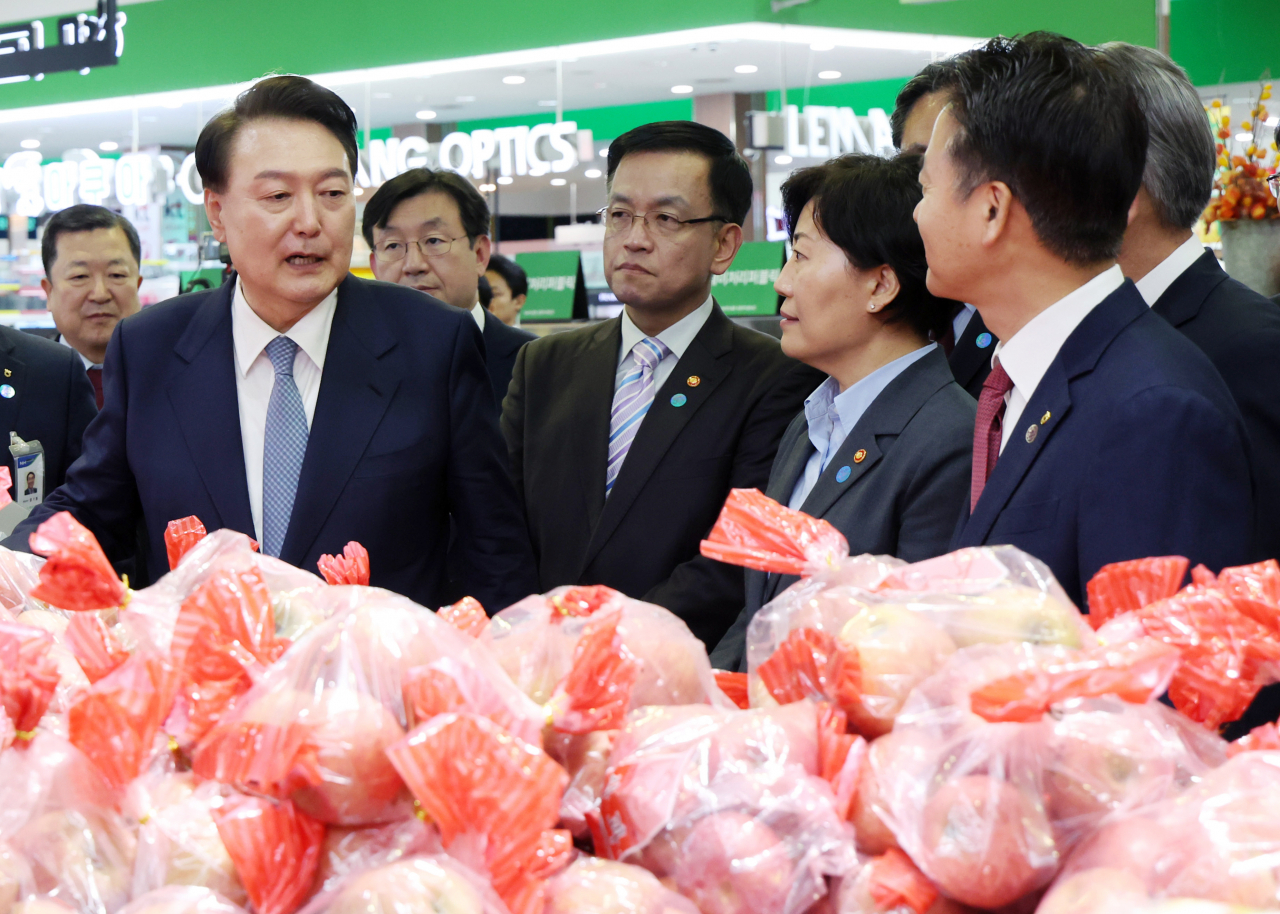 |
President Yoon Suk Yeol (left, front row) speaks with ministers of his administration as he visited the Nonghyup Hanaro Mart's Yangjae branch in Seocho-gu, Seoul on Monday. (Pool photo via Yonhap) |
President Yoon Suk Yeol on Monday pledged to lay out contingency measures to stem the acute food price hikes in South Korea.
Beginning Monday, at least 150 billion won ($112.5 million) of emergency funds will be deployed to stabilize the price partly by reducing or lifting tariffs on imported fruit, on a limited amount of agricultural goods or processed foods.
If the plan as of Monday goes full-fledged, a total of 29 types of fruit will be subject to "tariff quotas" -- permission to import a certain quantity of a commodity at low or no tariffs -- in South Korea.
Cherries, kiwis, mangosteen and pineapples will be added to the current 24 types of tariff-reduced items including bananas and oranges.
More state subsidies will also be applied in the field of logistics. With the state funds, more types of fruit will be eligible for discounts not only in supermarkets but also in traditional markets and on e-commerce platforms.
The measures will be in place for any type of produce that suffered a disruption in supply due to bad weather "until the price of all agricultural goods stabilizes to the normal level," Yoon said during an extraordinary meeting at Nonghyup Hanaro Mart's Yangjae branch in Seocho-gu, Seoul.
Last week, the price of apples in South Korea, in particular, topped 90,000 won for 10 kilograms for the first time in history. The price was more than double compared to that of a year prior. As Yoon visited the store in southern Seoul before the meeting, apples were retailing at about 41,500 won per 10 kilograms thanks to the government subsidies already in place and the store's discount policy.
Yoon described consumer prices as "people's top priority" and stressed the matter is the "most basic barometer to immediately feel the results of policies."
Yoon also urged policymakers to battle the consumer price hikes promptly so that the impacts of such measures could be quickly felt by ordinary people.
Attending the meeting were Prime Minister Han Duck-soo, Finance Minister Choi Sang-mok, Agriculture Minister Song Mi-ryung and Fisheries Minister Kang Do-hyung.
This meeting came after data from Statistics Korea earlier in March showed that South Korea was suffering from historic inflation regarding the price of fresh produce.
Fruit prices in February, according to data, rose 41.2 percent compared to the previous year. The figure amounted to the biggest price increase since September 1991.
Specifically, tangerine prices jumped 78.1 percent year-on-year, apple prices soared 71 percent and pear prices surged 61.1 percent. Tomatoes and strawberries also saw their prices surge by 56.3 percent and 23.3 percent, respectively.
Abnormally low temperatures in April last year hampered fruit production, as seen by the annual apple production in South Korea, which fell by 30 percent in 2023 compared with the previous year, according to the presidential office.
The uptrend drove inflation here to rise back above the 3 percent mark in just a month.







![[Today’s K-pop] Blackpink’s Jennie, Lisa invited to Coachella as solo acts](http://res.heraldm.com/phpwas/restmb_idxmake.php?idx=644&simg=/content/image/2024/11/21/20241121050099_0.jpg)